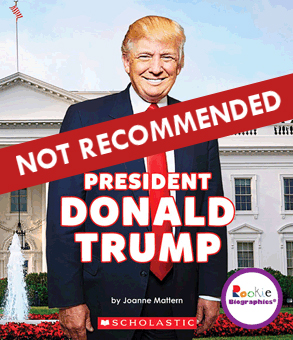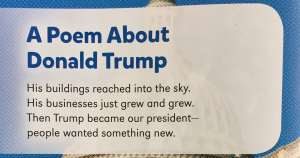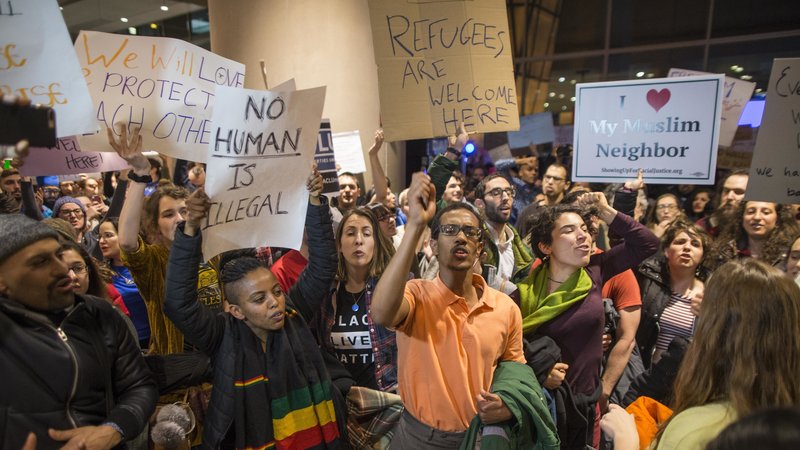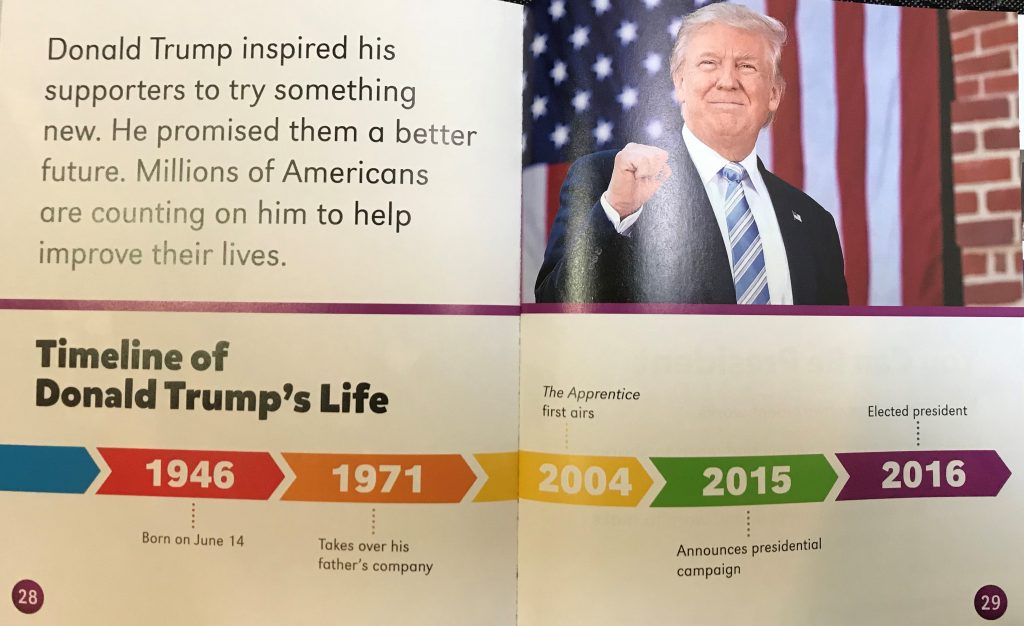Update Nov. 2019: Scholastic’s celebratory children’s books about Donald Trump are finally OUT OF PRINT, after thousands of teachers, parents, and students sent letters.
Update June 2018: Scholastic issued a statement, defending the books without responding to any of the points in the review below. Read more in Despite National Outrage, Scholastic Defends Children’s Books Celebrating Trump.
Review by Kathleen Nganga and Sarah Cornelius
His buildings reached into the sky.
His businesses just grew and grew.
Then Trump became our president–
People wanted something new.

This poem, which reads like promotional campaign material targeted at children, comes from Scholastic’s Rookie Biography series.
President Donald Trump by Joanne Mattern (2017) claims to offer young readers an informative, accurate, and unbiased narrative about the 45th U.S. president; however, as the poem above illustrates, it falls far short of that mark.
This failing comes despite the author’s and the publisher’s stated intention to produce a balanced narrative. In an interview with The New York Times on the challenges of writing on Trump for young readers, Mattern said, “for a children’s audience, the mandate is to provide unbiased facts with a dusting of the context required to maintain accuracy.” Joana Costa Knufinke, a nonfiction editor at Scholastic, is quoted saying “We make an effort to show both points of view.”

President Donald Trump is anything but neutral. The book outlines Trump’s personal and professional life with a celebratory tone. It omits facts, glosses over context, and ignores opposing perspectives.
Our concern with the text is not the accuracy of the statements and events included, but rather with the extensive omissions that undermine a truthful, nuanced, and informative account. These partial truths construct a false narrative. Scrubbing away any trace of complexity or nuance from an account about an elected official stunts the quintessential democratic freedom and responsibility of questioning and critiquing those in positions of power. We find this book to be dangerous from a democratic standpoint.

The incomplete story that Mattern tells does not appear false on its face. Jia Tolentino, reviewing the book in the New Yorker, describes it as “devastatingly impossible” to argue with the author’s representation of Trump’s presidential run, for example. The passage reads:
[Trump] was an unusual choice because he had no experience in politics. Some people liked him because he was an outsider who was new to working in the government. Trump ran against Hillary Clinton. She had a lot more experience in politics.
Yes, this is all true. However, there is no reference to the substance of Trump’s campaign, to the nativist, racist rhetoric of “Make America Great Again.” Perhaps words like Islamophobia, xenophobia, and misogyny are too complicated for first and second graders, but the concepts of exclusion and unfair treatment are certainly within reach.
Notably, according to The New York Times, when Mattern wrote another children’s book on Trump for a different publisher, Running Press Kids, she was given discretion to include relevant topics and chose to write a section on Trump’s proposal for a Muslim ban. She justified her decision by saying “This is a big part of Trump’s policies and a big reason he was elected. You couldn’t leave it out.” Therefore, the omission of the Muslim ban and other derogatory and inflammatory statements in the Scholastic book is even more glaring.
First and second graders are at an age when their perspectives about social change and citizenship begin forming. In presenting a simplified, positive narrative Mattern fails to expose young readers to critical thinking practices.

For instance, in the section concerning Trump’s business career, Mattern omits the human toll of some of Trump’s business decisions. Mattern only references the grandeur of his projects but fails to reference that Trump and his father came under government scrutiny for discriminatory housing practices in those very buildings (which inspired this Woody Guthrie song).
Although the Trumps settled the housing case, the lack of any reference to grievances raised about exclusionary housing practices paints an incomplete and ultimately biased narrative. The same can be said for the omission of any reference to his failures to pay those who built several of his properties. It would be entirely age appropriate to include in this section sentences like “Some of the builders who worked for Trump were not treated fairly” or “Some people claimed that Trump discriminated against people of color who wanted to live in his buildings.”
Furthermore, the book not only fails to visually feature people of color or those with other marginalized identities who were attacked and denigrated by Trump during the campaign, but also effectively silences their voices by repeatedly excluding their narratives and perspectives from the text. Mattern’s description of the 2016 presidential election demonstrates this. She writes:
On November 8, 2016, Americans voted for president. The race was close, but Trump won. Many people were happy. They looked forward to a brand-new government. They hoped for a stronger country.
While this passage acknowledges the outlook of those who were satisfied with the outcome of the election, it silences voices of dissent, ignores acts of resistance, and, crucially, excludes any reference to the words and deeds of racism, xenophobia, Islamophobia, and misogyny that have defined Trump’s campaign and presidency. By omitting the feelings, opinions, perspectives, and actions of those dismayed, alarmed, and activated by Trump’s election, the book misses a critical opportunity to engage young readers with important discussions of elections as well as democratic forms of participation beyond the ballot.
The Scholastic book on Trump for grades 3-5, A True Book about President Donald Trump, acknowledges the existence of dissent. It includes a page on “Campaign Statements” that says “Trump made several statements during his campaign that were concerning to some people,” and includes a photo of a diverse group of protesters. However, this is the singular inclusion of people of color in the 48-page book. It makes no explanation of who was concerned, nor why.
Presenting uncomplicated glory stories of public leaders, whether they be about Nelson Mandela, Susan B. Anthony, or Donald Trump, does a disservice to children’s understanding of leadership and social change. Not acknowledging the failings or limits of leaders teaches young readers that those with power are without flaws and capable of creating change on their own. The last line of the President Donald Trump book exemplifies this danger. It reads:
Millions of Americans are counting on [Trump] to help improve their lives.
We must resist the tendency to place all hope on the shoulders of one mythologized leader and instead promote the power of the collective voices and actions of “ordinary” people to challenge injustice, improve lives, and bring about a better future.

Publishers must produce books that provide a more complex account of presidents and other public figures. Responsible democratic citizenship and critical thinking rest on a foundation of truth. By presenting a glowing account of an exceedingly controversial president, this book falls far short of providing it. It is especially important in this age of false news and the discrediting of expertise to promote nuanced and accurate renditions of history.
Our children deserve access to resources that equip them to develop democratic values, to think critically, and to examine their world in a truthful way. We hope that future biographies lean away from simplified and celebratory narratives and instead embrace truth, nuance, and complexity.
Kathleen Nganga and Sarah Cornelius are Truman Scholars interning at Teaching for Change in the summer of 2018. They both studied political science and are interested in social justice education and improving educational outcomes for all students.
Take Action: This is not the first time that Scholastic been called to account for misleading children. In 2017, readers asked why the Scholastic News stories about the devastation of Houston by Hurricane Harvey made no reference to climate change. In 2016, a protest of A Birthday Cake for George Washington led to the book’s recall. In 2011, Rethinking Schools exposed a partnership between the American Coal Federation and Scholastic to distribute educational materials that described the benefits of coal without any reference to the dangers. It’s time to say Step Up Scholastic. Write or call to demand accuracy in non-fiction books for children. Let us know what action(s) you take with respect to Scholastic’s President Donald Trump.

And when he is impeached, convicted, and/or removed from office WILL YOU REMOVE THIS BOOK from circulation? His only businesses – if you insist on calling them that – still in operation are his MONEY-LAUNDERING Trump Org. and Ivanka’s rag trade. How could a casino go bankrupt? Have you seen the Donald J. Trump “Park” in Westchester County NY? It is an uncared-for overgrown jungle…a BLIGHT on a green space in New York State. Google it and you’ll see photos. The camera does not lie. DISGUSTING.
Scholastic, you need to step up and be objective in your factual books. Such omissions and obsfuscations as outlined above are not acceptable and will prevent your books from being read in the future.
Scholastic News often appears as a propaganda puppet rag. If the desire is to be positive (great, especially with children) there are many many choices. To pick for adulation The Head P—-Y Grabber, a classic unapologetic misogynist, one to never meet a racist or a dictator he couldn’t lavish with praise, this choice is unconscionable!
You owe children far better role models.
I sent a letter via StepUpScholastic sharing my views on the ways in which PRESIDENT DONALD TRUMP could have been/should be more even-handed.
Dear Scholastic —
I grew up participating in Scholastic Book Clubs — they were one of the highlights of my grade school years.
But I just read the following article and I feel sick. https://socialjusticebooks.org/scholastic-childrens-book-on-trump/
I believe what they say. How can you mislead children this way?
Please withdraw this book from your publication list.
I expect more of you.
Jane Burnett
While I agree with the principles of full disclosure and resistance to whitewashing Trump’s history, calling for this book’s recall – while well-intended – might create a backlash that could be spun by alt-right/Conservative media as proof that “the Liberal Left” wants to censor speech.
In this effort, you might win the battle but lose the war. I suggest, instead, that rather than fighting against the publication of this book, an effort should be led to counterbalance it with something better.
The best victory is won not by defeating the opposition but by making the opposition’s message irrelevant.
As a former teacher, I am very upset by the tone and language in this book about Donald Trump. It is extremely important that children are presented with truthful depictions of famous/infamous people. By only telling positive things about Trump, you are robbing children of the ability to think and make up they’re own minds. It is made worse by the fact that teachers and students live and trust Scholastic wholeheartedly.
I am an elementary school teacher specializing in social studies. I won’t ever purchase another Scholastic product again. I will not distribute any literature that they send. I will inform other teachers and parents.
Well done, Teaching for Change! I’m studying for my masters in elementary ed, planning to teach starting in 2020. In my substitute work this past year, I was regularly beside myself, having to read often inane and vacuous “news” stories to kids which failed to include critical facts — and interesting ones — with which kids from 1st grade to 6th could identify. I had no idea Scholastic also published useless books such as this and others. I had already planned to boycott use of he Scholastic Readers from my classroom; now I will surely avoid using the company’s publications, other than to hold them up as starting points to say to kids “here’s what teachers are asked to share with you,” after which I will show them content which provides them the full picture. One other thing, these Trump stories; aside from leaving out 90% of the factual context, the remaining information this author does write is utterly useless. Students don’t actually learn anything about anything, other than that they should admire a miscreant.